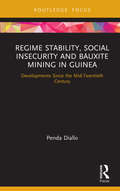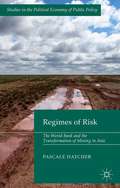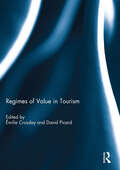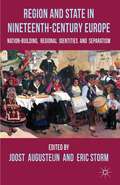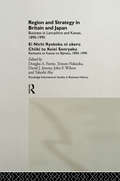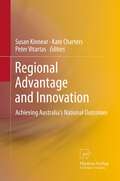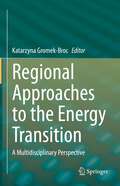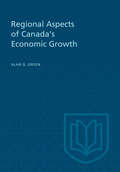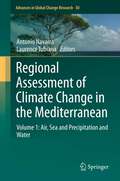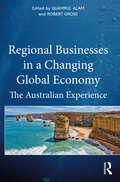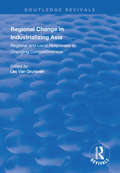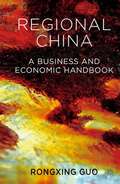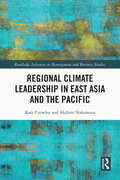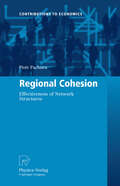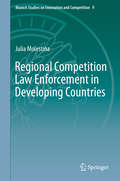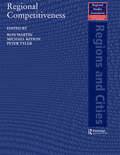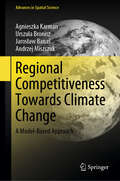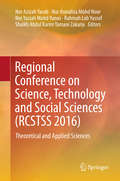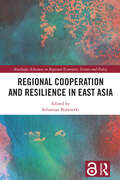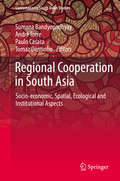- Table View
- List View
Regime Stability, Social Insecurity and Bauxite Mining in Guinea: Developments Since the Mid-Twentieth Century (Routledge Studies of the Extractive Industries and Sustainable Development)
by Penda DialloThis book explores how bauxite mining has affected local and national political dynamics in Guinea over the past 55 years, providing an overview of mining interactions with social, economic and political spheres. Guinea is amongst the world’s top producers of bauxite, and the country’s rich mineral presence has numerous implications on local communities and national policy. Guinea is an interesting and highly relevant case study in assessing the impact of bauxite mining on regime stability and social insecurity. The author offers a clear understanding of the role of mining during the Touré and Conté regimes and analyses how changes since the election of Condé in 2010 have affected the socio-political and economic development of Guinea. The author also offers analysis on how bauxite mining has led to the emergence of new forms of social contracts, sustained by mining companies instead of the state. Finally, the book argues that understanding the stabilising and destabilising potential of mining is key to ensuring long-term, sustainable, stable and inclusive growth of mineral-resource-rich countries. The book concludes by highlighting the relevance of the findings in Guinea for the wider African extractives sector. The book will be of interest to a wide range of scholars, including those working in the areas of African studies, political science, political economy, sustainable development and corporate social responsibility. The book will be relevant for academics, business actors, NGOs, policy-makers and students interested in the African mining sector.
Regime of Obstruction: How Corporate Power Blocks Energy Democracy
by William K. CarrollRapidly rising carbon emissions from the intense development of Western Canada's fossil fuels continue to aggravate the global climate emergency and destabilize democratic structures. The urgency of the situation demands not only scholarly understanding, but effective action. Regime of Obstruction aims to make visible the complex connections between corporate power and the extraction and use of carbon energy. Edited by William Carroll, this rigorous collection presents research findings from the first three years of the seven-year, SSHRC-funded partnership, the Corporate Mapping Project. Anchored in sociological and political theory, this comprehensive volume provides hard data and empirical research that traces the power and influence of the fossil fuel industry through economics, politics, media, and higher education. Contributors demonstrate how corporations secure popular consent, and coopt, disorganize, or marginalize dissenting perspectives to position the fossil fuel industry as a national public good. They also investigate the difficult position of Indigenous communities who, while suffering the worst environmental and health impacts from carbon extraction, must fight for their land or participate in fossil capitalism to secure income and jobs. The volume concludes with a look at emergent forms of activism and resistance, spurred by the fact that a just energy transition is still feasible. This book provides essential context to the climate crisis and will transform discussions of energy democracy. Contributions by Laurie Adkin, Angele Alook, Clifford Atleo, Emilia Belliveau-Thompson, John Bermingham, Paul Bowles, Gwendolyn Blue, Shannon Daub, Jessica Dempsey, Emily Eaton, Chuka Ejeckam, Simon Enoch, Nick Graham, Shane Gunster, Mark Hudson, Jouke Huizer, Ian Hussey, Emma Jackson, Michael Lang, James Lawson, Marc Lee, Fiona MacPhail, Alicia Massie, Kevin McCartney, Bob Neubauer, Eric Pineault, Lise Margaux Rajewicz, James Rowe, JP Sapinsky, Karena Shaw, and Zoe Yunker.
Regimes of Risk
by Pascale HatcherThe World Bank and New Mining Regimes in Asia critically investigates the particular role played by the World Bank Group (WBG) in both conceptualising and promoting new mining regimes tailored for resource-rich country clients. Building on case studies located in Laos, Mongolia and the Philippines, the author details a particular politics of mining in the Global South characterised by the transplanting, hijacking and contesting of the WBG's mining agenda in national and local arenas. Importantly, the failings of this agenda over time have not proved terminal but have rather provided opportunities for paradigmatic renewal. As part of a broad regime of governance designed to attract foreign private sector investment by the WBG in the name of poverty reduction, novel socio-environmental safeguards and the enrolment of civil society have now become a new porte-etandard to once again legitimise continued and expanded involvement in the mining sector. However, much like earlier incarnations of neoliberalism in the mining sector, the promotion by the WBG of this new Social Development Model continues to exhibit serious repercussions for constituents in the Global South, bringing into question the legitimacy of the model itself. "
Regimes of Value in Tourism
by Émilie Crossley and David PicardDrawing from ethnographic work in five continents, this book demonstrates how different regimes of value in tourism can coexist, collide, and compete across a varied geographic terrain. Much theory in tourism economics defines ‘value’ as a measure of monetary worth, a concept governing commodity exchange, and a gauge for tourist satisfaction. The research included in this volume shows that tourism not only feeds off existing conceptions of value as a monetary category, but that it is also instrumental in reproducing and reinforcing those subjective, morally heightened, and highly intangible values that make tourism and the tourism economy a complex social, cultural, political, and psychological phenomenon. The book pushes the debate about the tourism economy beyond a simplistic understanding of producer-consumer relations, instead suggesting a refocus on the social, spatial, and temporal lags in tourism production, and the ensuing differentiated regimes of values.This book was published as a special issue of the Journal of Tourism and Cultural Change.
Region and State in Nineteenth-Century Europe: Nation-Building, Regional Identities and Separatism
by Joost Augusteijn Eric StormIn reaction to the centralizing nation-building efforts of states in nineteenth-century Europe, many regions began to define their own identity. In thirteen stimulating essays, specialists analyze why regional identities became widely celebrated towards the end of that century and why some considered themselves part of the new national self-image.
Region and Strategy in Britain and Japan: Business in Lancashire and Kansai 1890-1990 (Routledge International Studies in Business History #Vol. 7)
by John F. Wilson Douglas A. Farnie Tetsuro Nakaoka David J. Jeremy Takeshi AbeHighlighting the importance of regional and national differences in industrial development, this book is a pioneering long term comparison of the two regions of Lancashire and Kansai.
Regional Advantage
by Annalee SaxenianLike the Greeks who sailed with Jason in search of the Golden Fleece, the new Argonauts--foreign-born, technically skilled entrepreneurs who travel back and forth between Silicon Valley and their home countries--seek their fortune in distant lands by launching companies far from established centers of skill and technology. Their story illuminates profound transformations in the global economy. Economic geographer AnnaLee Saxenian has followed this transformation, exploring one of its great paradoxes: how the "brain drain" has become "brain circulation," a powerful economic force for development of formerly peripheral regions. The new Argonauts--armed with Silicon Valley experience and relationships and the ability to operate in two countries simultaneously--quickly identify market opportunities, locate foreign partners, and manage cross-border business operations. The New Argonauts extends Saxenian's pioneering research into the dynamics of competition in Silicon Valley. The book brings a fresh perspective to the way that technology entrepreneurs build regional advantage in order to compete in global markets. Scholars, policymakers, and business leaders will benefit from Saxenian's firsthand research into the investors and entrepreneurs who return home to start new companies while remaining tied to powerful economic and professional communities in the United States. For Americans accustomed to unchallenged economic domination, the fast-growing capabilities of China and India may seem threatening. But as Saxenian convincingly displays in this pathbreaking book, the Argonauts have made America richer, not poorer.
Regional Advantage and Innovation
by Kate Charters Peter Vitartas Susan KinnearRegional areas are key building blocks of society in many countries. This compilation uses Australian case study examples to demonstrate how regional areas are uniquely well-placed to contribute to national goals in innovation, infrastructure provision, water and food security, environmental sustainability, industry diversification, healthy and liveable communities, and natural disaster preparedness and response. Each of these themes is examined in the context of using innovative approaches from regions to deliver outcomes that are nationally significant. Authorship is drawn from a balance of leading practitioners and academics to provide stories that are both engaging and rigorous. The case studies are contextualised by an analysis of regional advantage literature, discussion on the regional policy implications and lessons, and commentary around the key trends and drivers for innovation and regional advantage in Australia. The book provides a convincing argument that focusing on regional innovation and development offers significant benefits to a nation as a whole.
Regional Approaches to the Energy Transition: A Multidisciplinary Perspective
by Katarzyna Gromek-BrocThe book"Regional Approaches to the Energy Transition", discusses the key challenges the energy transition is facing at the European and International level. It is an edited collection gathering contributions from the experts in the field bringing together internationally renowned scholars, researchers, EU officials to address the current trends in the energy transition and its dilemmas.The book places the energy transition in a wide interdisciplinary context. It looks at energy policies, legal framework, regional strategies and the difficulties in their implementation. It argues for a regional approach to the energy transition, questioning at the same time the strategies and measures put forward for its realisation. The subject matter is topical, considering recent themes that occupy global and European political agendas.In a nutshell, the volume offers insights into regional regulations, public policies and local practices on the use of clean energy. It looks first at the EU commitment and its initiatives providing some examples from the Member States. Furthermore, it offers a comparative perspective and discusses the different approaches to the energy transition from Latin America, China, Africa and Australia. It covers a wide range of topics such as the EU renewable energy policies, Green Deal and regionalisation, energy auctions in the EU, environment in contemporary constitutionalism, Human Rights considerations, the Scandinavian perspective, practical examples from Italy and Spain. Moreover, it also considers the global context, looking at State and Market in China's coal-to-gas transition, tendencies of legal regulation in the sphere of renewable energy in Russia, the energy transition in Latin-American countries, regional approach to the energy transition and electricity access initiatives in Sub-Saharan Africa, and transnationalism and the regional approach to the energy transition in Australia. The systematisation that this book offers and the exchange of good practices and experiences are useful tools for the key players to seriously engage with a just and sustainable energy transition. The proposed book is a reference and study material for academics and students, but also for the policy makers, officials and practitioners dealing with the energy transition. It provides some answers, potential solutions and alternatives to the main problems that the energy sector is facing worldwide.
Regional Aspects of Canada's Economic Growth
by Alan G. GreenRegional disparities in income have been an important part of the growth of experience of most nation states. Canada is no exception. In a large country, thinly populated and having a wide diversity of resources, cultures, and locational advantages, it is only natural to expect the existence of dissimilar levels of economic performance. In fact, just this diversity of physical and human backgrounds has often provided the primary thrust for variations in natural economic growth. If, therefore, a better understanding of national development is to be obtained, some attention to the growth experience of the subnational units is imperative. This study aims at widening our understanding of the Canadian growth process by focusing on the relationship between regional and national changes since the last decade of the nineteenth century.
Regional Assessment of Climate Change in the Mediterranean
by Antonio Navarra Laurence TubianaThis is the third volume of a three-volume final report, which thoroughly describes, synthesizes and analyzes the results of the four-year Integrated Research Project CIRCE - Climate Change and Impact Research: Mediterranean Environment, funded by the EU 6th Framework Programme. Conducted under the auspices of the National Institute of Geophysics and Volcanology in Rome, Italy, the study was designed to predict and to quantify the physical impacts of climate change in the Mediterranean, and to assess the most influential consequences for the population of the region.
Regional Businesses in a Changing Global Economy: The Australian Experience
by Quamrul AlamIn a highly globalised trade and investment environment, businesses in regional areas must learn to take advantage of the benefits that stem from their geographical location. This book explains the immense value regional businesses bring to local communities and to Australia as a whole through case studies. The case studies are diverse in nature and highlight how regional businesses utilise their competitive advantage to introduce innovative practices and use local expertise, knowledge, skills, and networks to benefit from local social capital in a synergetic manner. The case studies in the book will help readers better understand the processes of industrial localisation. The examples of how innovative regional businesses have used innovative practices, local resource leverage, social and entrepreneurial skills and knowledge of international markets to develop and expand their businesses will provide insights into how regional businesses can achieve growth and secure jobs in an innovative and sustained manner.
Regional Change in Industrializing Asia: Regional and Local Responses to Changing Competitiveness (Routledge Revivals)
by Leo van GrunsvenFirst published in 1998 this boo responds to the dynamics of Industrializing Asia and the behavioural changes of actors which, in response to changing internal and external forces, have given rise to and are constantly giving rise to alterations in patterns of growth. From a geographical perspective, these are expressed in regional change, understood as a reconstruction of spatial organization. The imperatives of dynamic comparative advantage, changing global or regional competitiveness, and regional competition, faced by different actors, entities or territorial units can be identified as important forces underlying and shaping regional change. This volume provides further illumination, contextualization and interpretation of the spatiality of the economic reality in Industrializing Asia, as well as the role played by, and the implications for, different actors. The objectives of this book are 1) to outline the processes of regional change, linked to responses in the form of restructuring and integrative and regionalization tendencies, as well as the realignment of the global-regional-local divide in production systems/complexes and the operation of firms associated with reorganization of production in the process of maintaining and reconfiguring comparative advantage; 2) to highlight the wide scope of the process by considering differential units of analysis, linked to the agents and manifestations of regional change, and the role of scale in terms of the spatial units involved; 3) to highlight the implications as to the current and future position or role of differential actors/agents (particularly nation state) in shaping the new economic reality in the region and as a corollary, its positioning in the global economic order.
Regional China
by Rongxing Guo Luc Changlei GuoIt is a resource book that profiles the geography, demography, economy, political environment and business climates for each of China's 31 provinces. It will become a useful source book to researchers, businesses, government agencies, and news media interested in either the rapidly changing provincial economies or the Chinese economy as a whole.
Regional Climate Leadership in East Asia and the Pacific (Routledge Advances in Management and Business Studies)
by Kate Crowley Akihiro NakamuraThis book defines regional climate leadership in East Asia and the Pacific as a novel addition to the climate leadership theory. It develops criteria for measuring such leadership on a country basis and uses these for assessing the efforts of developed, lesser-developed, and developing countries within these regions.The book suggests that regional climate leadership consists of leading domestic actions, leading actions within the region, leading actions that are regionally coordinated, and leading actions on a differentiated basis between countries with greater and lesser capacity, and with neighbourly intent. The book is policy and climate solutions-focused, and identifies opportunities for lesson learning and policy transfer for more effective mitigation and adaptation. These solutions take into account the widely varying and complex geographical, political, and institutional circumstances of the region.It is intended for a broad readership of climate policy actors, including policy professionals, academics, non-government researchers, and all who are looking for climate leadership solutions to the problems of accelerating climate impact in East Asia and the Pacific.
Regional Cohesion
by Piotr PachuraThis book presents an interdisciplinary analysis of EU regional cohesion based on a network and clusters approach. The author explores the question if and how the presence of network structures supports the effectiveness of transformation in EU regions, in particular with a focus on non-pecuniary factors of regional growth. For a theoretical foundation of the topic, characteristics of a networking economy as well as the determinants of EU policies on regional development and innovation are examined and discussed. The empirical analysis at the core of this work presents and makes use of interdisciplinary methodological tools such as Data Envelopment Analysis (DEA), K-means models and self-organizing maps.
Regional Cohesion: Effectiveness of Network Structures (Contributions to Economics)
by Piotr PachuraThis book presents an interdisciplinary analysis of EU regional cohesion based on a network and clusters approach. The author explores the question if and how the presence of network structures supports the effectiveness of transformation in EU regions, in particular with a focus on non-pecuniary factors of regional growth. For a theoretical foundation of the topic, characteristics of a networking economy as well as the determinants of EU policies on regional development and innovation are examined and discussed. The empirical analysis at the core of this work presents and makes use of interdisciplinary methodological tools such as Data Envelopment Analysis (DEA), K-means models and self-organizing maps.
Regional Competition Law Enforcement in Developing Countries (Munich Studies on Innovation and Competition #9)
by Julia MolestinaThe book examines the potential for regional competition law systems as enforcement tools in developing countries, based on a case study of the West African Economic and Monetary Union, the Andean Community and the Caribbean Community.It analyses the allocation of enforcement competences between the regional/supranational and the national level and formulates detailed guidelines on the optimal degree of centralization or decentralization. The book addresses all readers that are interested in the enforcement of competition law in developing countries. Moreover, it provides practical insights for public institutions that wish to identify or prevent possible misallocation of competences within regional competition law systems.
Regional Competitiveness (Regions and Cities #30)
by Ron Martin Peter Tyler Michael KitsonThere is now a wide spread interest in regions as a key focus in the organization and governance of economic growth and wealth creation. This important book considers the factors that influence and shape the competitive performance of regions. This is not just an issue of academic interest and debate, but also of increasing policy deliberation and action. However, as the readings in this book make clear, the very idea of regional competitiveness is itself complex and contentious. Many academics and policy makers have used the concept without fully considering what is meant by the term and how it can be measured. Policy formulation has tended to rush ahead of understanding and analysis, and the purpose of this book is to close this important gap in understanding. This book was previously published as a special issue of Regional Studies.
Regional Competitiveness Towards Climate Change: A Model-Based Approach (Advances in Spatial Science)
by Andrzej Miszczuk Agnieszka Karman Urszula Bronisz Jarosław BanaśThis book analyzes the competitiveness of European regions and presents forecasts for 2030 and 2100 under different climate scenarios. It examines the economic impact of climate change from a regional economic perspective and sheds light on various factors that influence regional competitiveness and development. Furthermore, the authors derive reflections on EU climate policy and policy recommendations from the empirical results, which will help both scientists and regional decision-makers to implement policy measures and develop successful adaptation processes for the regions and countries of the EU to climate change.
Regional Conference on Science, Technology and Social Sciences: Theoretical And Applied Sciences (RCSTSS #2016)
by Nor Azizah Yacob Nur Asmaliza Mohd Noor Nor Yuziah Mohd Yunus Rahmah Lob Yussof Shaikh Abdul Karim Yamani ZakariaThis book gathers selected theoretical and applied science papers presented at the 2016 Regional Conference of Sciences, Technology and Social Sciences (RCSTSS 2016), organized biannually by the Universiti Teknologi MARA Pahang, Malaysia. Addressing a broad range of topics, including architecture, computer science, engineering, environmental and management, furniture, forestry, health and medicine, material science, mathematics, plantation and agrotechnology, sports science and statistics, the book serves as an essential platform for disseminating research findings, and inspires positive innovations in the region’s development.The carefully reviewed papers in this volume present work by researchers of local, regional and global prominence. Taken together, they offer a valuable reference guide and point of departure for all academics and students who want to pursue further research in their respective fields.
Regional Cooperation and Resilience in East Asia (Routledge Advances in Regional Economics, Science and Policy)
by Sebastian BobowskiThis book argues that a resilient region should act reactively and proactively in the face of shocks and disruptions and asserts that the institutionalization of regional cooperation may be the answer to development challenges in times of uncertainty and instability.It considers regional, transregional, and subregional cooperation initiatives for building regional resilience and critically examines a broad spectrum of issues, such as international security and trade, economic development, value chains in production, and social welfare. Adopting the concept of resilience allows for a holistic, dynamic, and systematic approach to the studies on the regional process of institutionalization, responsiveness, and adaptability to challenging circumstances. The economic and social indicators of the countries in the region are examined alongside an analysis of the regional institutional architecture.The reader is acquainted with the essence of resilience concerning each category of challenges and the mechanisms of its achievement and strengthening through regional integration. The interdisciplinary character of the book makes it suitable for usage not only by economists but also by lawyers. As such, the book will be helpful to scholars and students of international economics, international security, and policymakers.
Regional Cooperation in South Asia
by André Torre Paulo Casaca Sumana Bandyopadhyay Tomaz DentinhoThis book highlights various challenges and opportunities for regional cooperation and development in South Asia. In light of the ongoing globalization process, the contributors investigate how socio-economic developments are changing the spatial organization of production as well as the profile of cities and landscapes, are stimulating the creation of maritime, terrestrial and aerial channels, and are putting increasing pressures on natural and environmental resources. The book is divided into four parts: The first part analyses the increasing intensity of regional trade, migration and investment flows; the second focuses on channels and adapted spaces. The third part addresses sustainability and natural resources, while the fourth highlights institutional issues.
Regional Cultures and Mortality in America
by Stephen J. Kunitz Ning Zhang"Across the contiguous 48 states, populations in states with more activist civic cultures have lower mortality than states that do not follow this model. Several different factors can be pointed to as causes for this discrepancy - net income, class inequality, and the history of settlement in each of the different states and regions. These observations are true of Non-Hispanic Whites and African Americans but not of American Indians, and Hispanics, neither of which is fully integrated into the state political culture and economy in which it resides. In Regional Cultures and Mortality in America, the struggles these various populations face in regard to their health are explored in terms of where they reside"--Provided by publisher.
